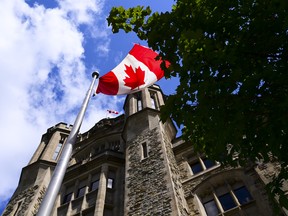As we head into a new year, Canadians are once again bracing themselves for the negative effects of federal tax policy. In 2024, Ottawa continued to increase taxes on Canadians, and unfortunately, things don’t look like they’ll be getting better in 2025.
A Look Back at Tax Policy Changes in 2024
To understand where we are headed, it’s essential to take a step back and examine the changes that have taken place over the past year. In 2018, before the government introduced its Canada Pension Plan (CPP) ‘enhancements,’ a worker earning $85,000 faced a combined employer/employee CPP tax of $5,188. By 2024, this same worker’s tax bill had risen to $8,111 – an increase of over 55%.
The Impact on Canadians in 2025
But that’s not all; the Trudeau government has also hiked capital gains taxes, which will affect not just individuals but also corporations. As economist Jack Mintz estimates, through their ownership of private corporations, about 4.74 million Canadians (or 15.8% of tax filers) will be impacted by this higher tax rate.
The Effects on Business Investment
Higher capital gains taxes will only exacerbate the already weak business investment in Canada. In recent years, Canada’s business investment has fallen behind that of the United States and other developed economies, contributing to our country’s productivity and economic stagnation crisis.
A Two-Month Sales Tax ‘Holiday’ with No Benefits
In a misguided attempt to stimulate the economy, the Trudeau government implemented a two-month sales tax ‘holiday.’ However, this move had little effect on consumers and imposed administrative and logistical nightmares on businesses. Moreover, it increased government deficits and added to our future tax burden – further reducing economic productivity.
Conclusion
As we enter 2025, Canadians are facing an uncertain economic landscape due in part to the federal government’s continued increase of taxes. Higher capital gains taxes will likely reduce business investment, exacerbating Canada’s productivity and stagnation crisis. It’s time for Ottawa to reassess its priorities and implement policies that promote economic growth and job creation.
References
- Mintz, J. (2023). The Impact of Capital Gains Taxes on Canadians. The Fraser Institute.
- Lau, M. (2024). Federal Tax Policy: A Barrier to Economic Growth in Canada. The Fraser Institute.
- Cross, P. (2023). Justin Trudeau’s Failed Vision for Canada. The Financial Post.
About the Author
Matthew Lau is a Toronto writer and adjunct scholar with the Fraser Institute. He can be reached at mlau@fraserinstitute.org.
Bookmark Our Website and Support Our Journalism
Stay up-to-date on the latest business news by bookmarking our website (financialpost.com) and signing up for our newsletters. Your support allows us to continue producing high-quality content that informs and engages Canadians.
Join the Conversation
We encourage readers to join the discussion in the comments section below. Share your thoughts, opinions, and experiences with federal tax policy and its impact on Canadians. Remember to keep comments relevant and respectful, and don’t forget to follow our Community Guidelines.




